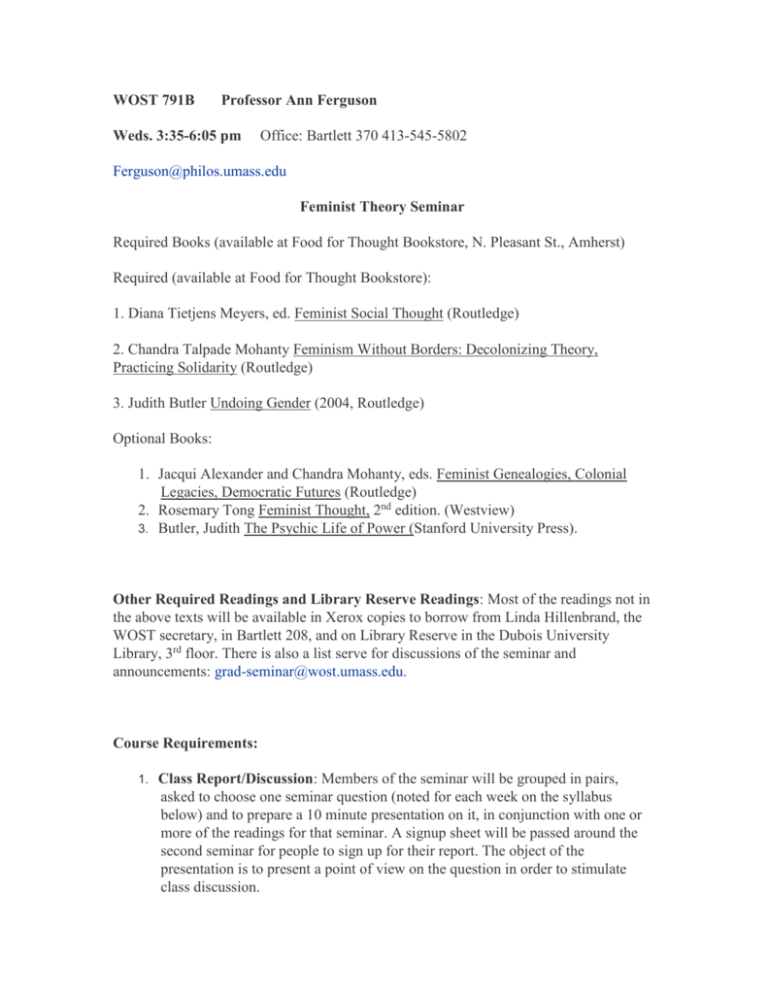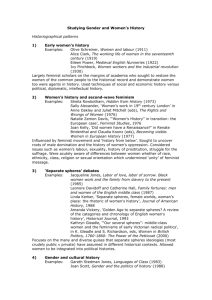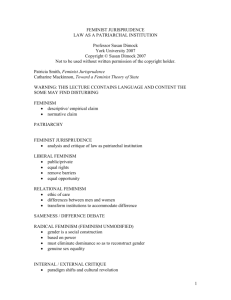
WOST 791B
Professor Ann Ferguson
Weds. 3:35-6:05 pm
Office: Bartlett 370 413-545-5802
Ferguson@philos.umass.edu
Feminist Theory Seminar
Required Books (available at Food for Thought Bookstore, N. Pleasant St., Amherst)
Required (available at Food for Thought Bookstore):
1. Diana Tietjens Meyers, ed. Feminist Social Thought (Routledge)
2. Chandra Talpade Mohanty Feminism Without Borders: Decolonizing Theory,
Practicing Solidarity (Routledge)
3. Judith Butler Undoing Gender (2004, Routledge)
Optional Books:
1. Jacqui Alexander and Chandra Mohanty, eds. Feminist Genealogies, Colonial
Legacies, Democratic Futures (Routledge)
2. Rosemary Tong Feminist Thought, 2nd edition. (Westview)
3. Butler, Judith The Psychic Life of Power (Stanford University Press).
Other Required Readings and Library Reserve Readings: Most of the readings not in
the above texts will be available in Xerox copies to borrow from Linda Hillenbrand, the
WOST secretary, in Bartlett 208, and on Library Reserve in the Dubois University
Library, 3rd floor. There is also a list serve for discussions of the seminar and
announcements: grad-seminar@wost.umass.edu.
Course Requirements:
1.
Class Report/Discussion: Members of the seminar will be grouped in pairs,
asked to choose one seminar question (noted for each week on the syllabus
below) and to prepare a 10 minute presentation on it, in conjunction with one or
more of the readings for that seminar. A signup sheet will be passed around the
second seminar for people to sign up for their report. The object of the
presentation is to present a point of view on the question in order to stimulate
class discussion.
2.
Short Paper (with copies for all participants) due in class ?? : Students should
address one of the questions discussed in Seminars I through VI. Arguments on
all sides of the issue should be presented, and your own position defended. Papers
should be from 4-8 pages.
3.
Term Paper: The term paper can be either a research paper or an extended
thought paper, depending on the topic, which demonstrates your command of the
debate around a particular issue, or a defense or critique of a particular feminist
theoretical approach. Your term paper can be an extended development of your
short paper for the seminar. An abstract and outline of your term paper,
including initial references, will be due at the last seminar. Final term paper
is due ?? by 5 pm in Bartlett 208.
Syllabus of Readings
I.
Sept. 8 Introductory Seminar: The Isms!! 1st and 2nd level Questions for
Theory
Calás and Smircich “From the Woman’s Point of View”, handout
Optional: Ferguson Blood at the Root, ch. 1; Tong Feminist Thought, pp.10-20, 45-71,
94-110.
II. Sept. 15 Liberal, Radical, and Materialist Feminism and The Agency/Structure
Question, Part I : What are the structures that perpetuate social domination? To what
extent are they universal and to what extent historically specific? How do they operate,
and which are key for perpetuating male domination?
Williams “The Equality Crisis” in Meyers Feminist Social Thought text
MacKinnon “Feminism, Marxism, Method and the State” in Meyers, Feminist Social
Thought text
Bunch “Lesbians in Revolt” in McCann and Kim, eds. Feminist Theory Reader
Fraser “Beyond the Master/Subject Model” (from Justice Interruptus).
Hartmann “The Unhappy Marriage of Marxism and Feminism; Toward a More
Progressive Union”, reprinted many places, including in Carol McCann and SeungKyung Kim, eds. Feminist Theory Reader: Local and Global Perspectives (check library).
Mohanty “Women Workers and the Politics of Solidarity”, Mohanty text, ch. 6
Carby “White Woman Listen!!”, in Hennessy and Ingraham, ed.Materialist Feminism
Optional: Ferguson “ On Conceiving Motherhood and Sexuality”, Meyers, Feminist
Social Thought
Wekker “One Finger Does Not Drink Okra Soup: Afro-Surinamese Women and Critical
Agency”, Alexander and Mohanty Feminist Genealogies, Colonial Legacies, Democratic
Futures; Hennessy “The Material of Sex”, Profit and Pleasure, ch 3.
III. Sept 22 The Agency/Structure Question, Part II Where is the agency? If social
structures enforce gender and other domination systems, to what extent are individuals
free to challenge them? How is social change possible? The Feminist Analysis of Rape.
Butler “Quandaries of the Incest Taboo”, Undoing Gender, ch. 7
Chodorow “Toward a Relational Individualism” from Feminism and Psychoanalytic
Theory
Mardorossian “Toward a New Feminist Theory of Rape”, Signs, (v.27, #3, Spring 2002)
Burton “Resistance to Prevention: Reconsidering Feminist Anti-violence Rhetoric”,
Teays et al, eds., Violence aganst Women.
Marcus “Fighting Bodies, Fighting Words: A Theory and Practice of Rape Prevention”,
Butler and Scott eds. Feminists Theorize the Political
Woodhull “Sexuality, Power and the Question of Rape”, from Diamond and Quinby, eds.
Feminism and Foucault .
Optional: Harland “Analyzing the Structures that Maintain and Resist Sexual Violence”
(Undergraduate Honors thesis, review of the literature on rape, on library reserve).
IV. Sept 29 Psychoanalytic Feminism: Subjectivity, Gender, Sexual Difference, and
Sexuality (Chodorow, Irigaray, Butler) Do we perform our gender or does it perform us?
How important is sexual difference and the “bodily imaginary”? How important is
symbolic gender in the social construction of subjectivity? Of sexuality? How does
gender connect to sexuality? Regarding the Agency/Structure question, how does the
psychoanalytic theory of the split self allow for agency, and for challenging
psychological/symbolic patriarchal structures?
Chodorow, “Gender, Relation and Difference in Psychoanalytic Perspective”, Meyers
text
Irigaray, “This Sex which is not One”, in This Sex Which is not One
Butler The Psychic Life of Power, ch 5
Alsop, Fitzsimons and Lennon, eds. Theorizing Gender, “Bodily Imaginaries” (ch. 7)
Weedon Feminist Practice and Poststructuralist Theory, ch 3
Optional:
Chodorow “Psychoanalytic Feminism and the Psychoanalytic Psychology of Women”, in
Chodorow Feminism and Psychoanalytic Thought; Kristeva “Stabat Mater”, Meyers text;
DiQuinzio The Impossibility of Motherhood, ch. 6 and 7; Rose Introduction II in
Feminine Sexuality: Jacques Lacan and the ecole freudienne, print reserve and ereserves.
V. Oct 6 Post-structuralism: How important are discourses and power/knowledges in
the construction of reality? Can the “linguistic turn” help us avoid over-universalizing
claims and provide a “history of the present” that can be a helpful tool for feminist
analysis? What problems does post-structuralism involve?
Butler “Contingent Foundations” from Butler and Scott eds. Feminists Theorize the
Political, reserve
Weedon Feminist Practice and Poststructuralist Theory, ch 2
Bartky “Foucault, Femininity. .”, Meyers text
Scott “Deconstructing Equality vs. Difference”, Meyers text
Mohanty “Under Western Eyes: Feminist Scholarship and Colonial Discourses”, in
Feminism without Borders, text
Butler, excerpt from Gender Trouble, Meyers text
Optional: Foucault History of Sexuality, v. 1, ch 2; Butler The Psychic Life of Power, ch
3
Weds. Oct 13 no seminar: Monday class schedule
VI. Oct 20 Intersectionality: Race/Ethnicity: How can we understand gender and
race/ethncity as interlocking systems? How do racial and ethnic differences alter gender
identity and political priorities? Are there problems with the intersectionality metaphor
as an analytic tool?
Lugones, “Playfulness, ‘World’-Traveling, and Loving Perception”, Meyers text.
Abel “Race, Class and Psychoanalysis? Opening Questions”, Meyers text
King “Multiple Jeopardy, Multiple Consciousness: The Context of a Black Feminist
Ideology”, Meyers text
Mohanty “Cartographies of Struggle: Third World Women and the Politics of
Feminism”, in Feminism without Borders
Moya “Postmodernism, “Realism” and the Politics of Identity: Cherrié Moraga and
Chicana Feminism” in Alexander and Mohanty, eds. Feminist Genealogies, Colonial
Legacies, Democratic Futures
Crenshaw “Whose Story is it Anyway? Feminist and Anti-racist Appropriations of Anita
Hill” from Morrison ed., Race-ing Justice, Engendering Power,
Brewer “Theorizing Race, Class and Gender”, from James and Busia, eds. Theorizing
Black Feminisms
Optional: Collins “Mammies, Matriarchs, and Other Controlling Images”, from Hill
Collins, Black Feminist Thought; Kanneh “Black Feminisms”, from Stevi Jackson and
Jackie Jones, eds. Contemporary Feminist Theories; Morrison, ed. Race-ing Justice,
Engendering Power, passim
VII. Oct. 27 Intersectionality: Sexuality and Queer Theory: To what extent is sexual
identity connected to gender identity? Is the connection universal or historically specific?
How does Queer Theory challenge lesbian/gay identity politics? What is (should be)
Queer Theory’s relation to feminism?
Student Short Papers Due in Seminar, with copies for all other seminar
participants
MacKinnon “Sexuality” in Linda Nicholson, ed. The Second Wave
Wittig “One is Not Born a Woman”, in Conboy et al, ed. Writing on the Body;
Butler Undoing Gender, ch 2 and 3; also in McCann and Kim, eds. Feminist Theory
Reader
Butler “Imitation and Gender Insubordination”, from Diana Fuss, ed. Inside/Out
Hausman Changing Sex: Semiotics of Sex, Gender and the Body, ch 6.
Stone “The Empire Strikes Back: A Posttranssexual Manifesto”, from Epstein and
Straub, eds. Body Guards: also in Katie Conboy et al, eds. Writing on the Body
Optional: Halperin “The Queer Politics of Michel Foucault”, from Halperin Saint
Foucault, Katz The Invention of Heterosexuality, passim; Hennessy Profit and Pleasure,
ch 4.
VIII. Nov. 3 Student Short Papers Discussed
Reading: Student Short Papers
Homework: Please come with written comments and feedback on each paper
IX. Nov. 10 Queer Theory continued: How can a non-essentialist feminism understand
the oppression of women under patriarchal systems? And how can queer identities linked
to different racial, identity and class positions be understood? How can a feminist
coalitional politics resolve the tensions within queer identities, such as bisexual and
transsexual identities that challenge the concept of feminist identity politics based on
organizing natural born “women”?
Butler Undoing Gender, ch 5, 10
Smith “Mistaken Identity”, from Morton ed. The Material Queer
Lorde “I Am Your Sister: Black Women Organizing across Sexualities”, in McCann and
Kim, eds. Feminist Theory Reader
Aguilar-San Juan “Going Home: Enacting Justice in Queer Asian America”, in Ibid.
Spivak (with Ellen Rooney) “In a Word: Interview” in Nicholson ed. The Second Wave
hooks “Sisterhood: Political Solidarity between Women”, Meyers text
Optional: Warner Fear of a Queer Planet, Introduction; Fuss Essentially Speaking,
passim; Hennessy, Profit and Pleasure ch 6
X. Nov. 17 Feminist Epistemology, Objectivism and Ethical Relativism: Can the idea
of epistemological standpoints resolve the traditional problem of objectivism (there are
universal ethical values and independent facts ) vs. relativism (values and facts are
relative to observers’ perceptions)? How does a pluralist democratic politics deal with
the problem of relativism? Do where values originate (e.g from the West, or within nonWestern cultures) make a difference as to whether they apply to other cultures?
Hartsock “The Feminist Standpoint”, Meyers text
Haraway “A Manifesto for Cyborgs”, Meyers text
Collins, Black Feminist Thought , 2nd edition, ch. 11, “Black Feminist Epistemology”
Jaggar “Global Responsibility and Western Feminism”, mss., reserve
Nicholson and Fraser “Social Criticism without Philosophy”, reserve; also in Nicholson,
ed. Feminism/Postmodernism.
Narayan “Contesting Cultures: ‘Westernization’, Respect for Cultures, and Third World
Feminists” in Nicholson ed. . The Second Wave
Optional: Harding Whose Science, Whose Knowledge: Thinking from Women’s Lives
No seminar Weds. Nov. 24 before Thanksgiving
XI. Dec. 1 Human Rights and Justice: Are there universal human rights? If so, what
are they and how do they relate to women’s liberation? Should feminists promote a
universal ethics of justice? How do we take context into account
Butler, Undoing Gender, ch.1
MacKinnon “Rape, Genocide and Women’s Human Rights”, Harvard Women’s Law
Journal 17 (1994),
Burn “Women’s Rights as Human Rights”, in Burn Women Across Cultures: A Global
Perspective
Fraser Justice Interruptus, ch. 2
Young Justice and the Politics of Difference (selected chapters)
Lewis “Women (Under) Development: The Relevance of the Right to Development to
Poor Women of Color in the United States”, in Wing, ed. Global Critical Race Feminism,
reserve; and in Course Packet II.
Optional: Nussbaum and Glover, eds. Women, Culture and Development, passim (or
Nussbaum Women and Human Development, passim)
Abstract and Outline of Term Paper due in Seminar Dec. 1
XII Dec. 8 Global Feminism, Development Theory, and Theory and Practice: Is
there some universal model of human, national and global development and human
good(s) that feminists can accept? If not, are there other models on which we can build
global feminist coalitions? Should national governments provide safety nets and basic
human services for their citizens, e.g. education and health, thus challenging neoliberalism? If they don’t, can NGOs empower women by doing so?
Nussbaum “Human Capabilities, Female Human Beings”, in Nussbaum and Glover, eds.
Women, Culture and Development , reserve; and in Course Packet II
Jaggar “ Saving Amina”, mss., ereserves
Ferguson “Resisting the Veil of Privilege: Building Bridge Identities as an Ethico-Politics
of Global Feminism”, Hypatia v. 13, #3 (Summer 1998),
Charlton et al “Women, the State and Development”, from Charlton, et al, eds. Women,
the State, and Development
Bourque “Gender and the State: Perspectives from Latin America”, from Charlton et al,
eds., Ibid
Ewig “Strengths and Limits of the NGO Women’s Movement Model: Shaping
Nicaragua’s Democratic Institutions”, Latin American Research Review, v. 34 #3 (1999)
Tinsman “Reviving Feminist Materialism: Gender and Neo-Liberalism in Pinochet’s
Chile”, Signs, v. 26 #1 (Autumn 2000).
Optional: Dandehar “International Development Paradigms and Violence Against
Women:” in French, Teays and Purdy, ed. Violence Against Women; Hirschman
“Women and Development: A Critique”, from Marianne Marchand and Jane Parpart, eds.
Feminism/Postmodernism/Development; Hennessy Profit and Pleasure ch 5, 7; Sen and
Grown Development, Crises and Alternative Visions, especially “Gender and Class”;
XIII.
Dec. 15 Post-colonialism and Globalization
(note: This is a make-up seminar to replace the one missed
on the Weds. Before Thanksgiving)
How can Western feminists avoid a neo-colonialist understanding of women’s
empowerment in poor countries of the South? What is globalization and how do
globalization processes both undermine and provide opportunities for women? How
should feminists deal with religious fundamentalisms of East and West?
Hochchild “Global Care Chains and Emotional Surplus Value”, from Hutton and
Giddens, eds. Global Capitalism, in Course Packet II
Mohanty, Feminism without Borders, ch 4, 9.
Mills “Postcolonial Feminist Theory” in Jackson and Jones, eds., Contemporary Feminist
Theories
Yuval-Davis “Women, Ethnicity and Empowerment”, in Oakley and Mitchell, eds.
Who’s Afraid of Feminism?
Moallem “Transnationalism, Feminism and Fundamentalism”, in Kaplan, Alarcón and
Moallem, eds. Between Woman and Nation
Ferguson “Can Development Create Empowerment and Women’s Liberation?”
www.globaljusticecenter.org. Go to Encuentro 2004, papers.
Optional: Molyneux “Mobilization without Emancipation? Women’s Interests, the State
and Revolution in Nicaragua”, in Women’s Movements in International Perspective,
reprinted in McCann and Kim, eds. Feminist Theory Reader; Miles Integrative Feminism,
ch. 6, 9.
Final term paper due Monday, Dec. 20 by 5 pm in Bartlett 208










